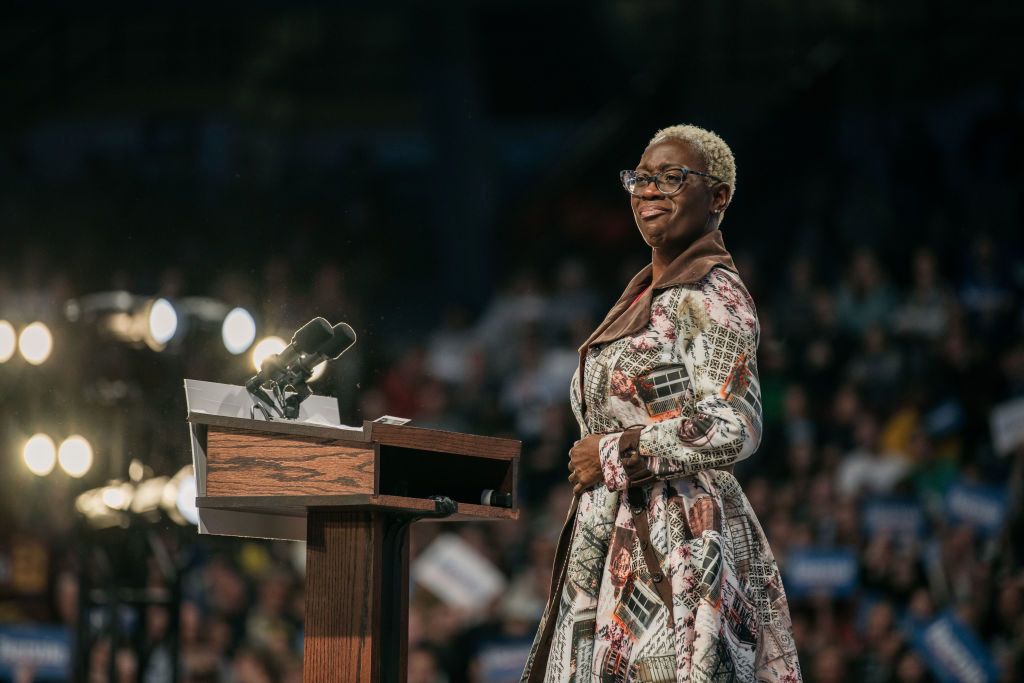Feel The Bern: Hillary Clinton Snubs Nina Turner And Endorses Rival Candidate Shontel Brown
The race to replace Housing and Urban Development Secretary Marcia Fudge‘s U.S. House seat in Ohio got a fresh jolt on Wednesday when Hillary Clinton offered her endorsement.
Only instead of the former Secretary of State opting to lend her support to Nina Turner, the leading candidate, Clinton decided to throw her weight behind Shontel Brown, a little-known county councilwoman who polling suggests doesn’t have even the slightest chance to win.
People are often forced to pick a side when it comes to politics. But typically, if a national political party endorses a candidate, members of the said party are expected to follow suit and do the same. And though every single Democratic state senator from Ohio’s Cuyahoga County — where Brown is the Chair of the local Democratic Party — has endorsed Turner, Clinton took a decidedly different tack.
“I’m proud to endorse @ShontelMBrown for Congress in the OH special election,” Clinton tweeted Wednesday afternoon. “Shontel made history as the first Black woman to chair her county Dem party, and she’ll work to help her state and our country recover from COVID. Join me in supporting her.”
A closer look at Clinton’s endorsement suggests that she may have chosen to support Brown because of Turner’s allegiance to Vermont Sen. Bernie Sanders, for whom she worked as national co-chair for his 2020 presidential campaign as well as a national surrogate for his 2016 bid.
But Clinton, as some might remember, not too long ago launched a sneak attack on Sanders with revealing comments in a documentary that included the memorable one-liner: “Nobody likes him.”
Perhaps, still feeling the Bern, so to speak, Clinton doubled down on her expressed disdain for Sanders by snubbing his loyal adviser, Turner, and instead endorsing her opponent.
It was in that context that Brown rejoiced at Clinton’s endorsement and said she was “incredibly honored.” Brown made sure to mention in a statement that she did volunteer work with Clinton’s 2016 campaign and noted that she has been “inspired by [Clinton’s] message to put women at the head of the table, finally.”
Politics are not immune to pettiness, as we have all seen time and time again. Clinton’s endorsement could very well be the latest proof of that truth.
In the meantime, Brown seemingly has a steep uphill path to winning the special election in August. Polling from earlier this month shows that Turner, 53, was enjoying support from about 50% of registered voters. Brown was the next closest candidate with 15% support.
However, 21% were undecided and could prove to be the X-factor in the election.
Notably, Roll Call reported in March that Brown is “a Fudge protégé who has the endorsement of Columbus-area Rep. Joyce Beatty and more than 100 other figures in the Democratic establishment” who “has attracted local and national attention as the candidate with the most support from the establishment.” Turner, conversely, was labeled an “occasional Fudge rival.”
As a member of Biden’s cabinet, Fudge — who served in Congress from 2008 to this year — is forbidden from making any political endorsements. But Fudge’s success at being re-elected multiple times to the Congressional seat up for grabs could mean that the voters who will ultimately choose her replacement want more of the same; something, in theory, that a “protégé” would deliver.
Turner in December signaled her intentions to run for the 11th Congressional District U.S. House seat by filing the requisite paperwork with the Federal Election Commission.
The former Ohio state senator became Sanders’ most prominent Black ally by traveling with him across the country, introducing him at rallies and helping him shape the campaign’s Black voter outreach in states like South Carolina.
Source: Handout / Getty
Her move for a Congressional run came just one day after it was announced that Joe Biden intended to nominate Fudge to be his HUD secretary-designate.
In March, Turner won a coveted endorsement from progressive New York Rep. Alexandria Ocasio-Cortez, whose support arguably carries much greater political capital than Clinton’s.
Turner has an enviable wealth of political experience aside from her key involvement in Sanders’ influential campaign.
Prior to being appointed to the Ohio State Senate in 2008, Turner served as a member of the Cleveland City Council beginning in 2006.
During her tenure in the State Senate, Turner served as the minority Whip while representing the state’s 25th District. After running an unsuccessful campaign for Ohio secretary of state in 2014, she decided against seeking re-election for her Senate seat.
Source: The Washington Post / Getty
In the months after Sanders suspended his 2020 presidential campaign, Turner founded a progressive-leaning PR company. The Amare Public Affairs firm could provide a glimpse of the core tenets upon which Turner will base her upcoming Congressional campaign.
“This moment in American history demands that progressive voices play a central role in the national conversation around a whole range of issues. The future is now. For too long, the voices of Black people, other people of color, women, and progressives were left out of that conversation, and our country has suffered as a result. We are living in a time when people, especially millennials and Generation Z, are demanding socially-conscious solutions from governments and corporations,” Turner said back in September. “We can build a better country and a more just society by engaging with each other in a meaningful way on the root causes of societal problems. That starts with ensuring our voice is heard from the streets of our forgotten cities to the roads of rural communities to Main Street America, and finally, to the halls of power in the public and private sectors.”
SEE ALSO:
Nina Turner, Sanders’ African American Aides Blame ‘Higher-Ups’ For Snubbing Black Voters
Nina Turner Calls For National Spotlight On Tamir Rice Case
[ione_media_gallery id=”3908112″ overlay=”true”]

